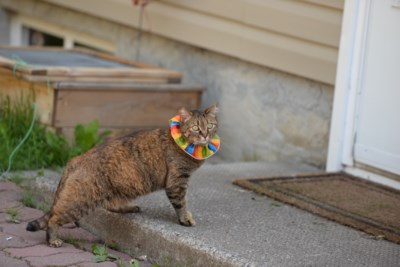Let’s face facts, cats have an intuition of hunting for prey just like their tiger and panther ancestors.
Some house cats even like to show off their catch of the day to their humans feeling proud of what they’ve accomplished, but does that mean the wildlife surrounding Prince George is being reduced as a result?
That’s the question UNBC is hoping to answer and if you describe your feline friend as a hunter, then you can help them with the continuation of a research study that began last month as soon as possible.
This next step is going to examine the predation nature in house cats and the group behind the study is hoping to figure out the number of wildlife kills-per-house cat in certain areas of Prince George and understanding the impact, big or small, they have on conservation.
 Cats considered as hunters wear a bright-coloured collar for a UNBC research study (via UNBC)
Cats considered as hunters wear a bright-coloured collar for a UNBC research study (via UNBC)“Recent estimates suggest that domestic and feral cats may be taking more than 100 million birds per year in Canada, making them one of the highest human-related sources of bird mortality,” says Biologist Dr. Ken Otter in a release, UNBC’s Ecosystem Science and Management program professor.
Part of the experiment is for volunteer cats to wear specialty GPS collars while they freely roam around and are logged on a timely basis by their owner, including how much time they spend outside.
The ultimate goal is to find out, from the collected research, if these collars would help reduce hunting efficiency and could be a solution in alerting birds of a cat nearby before they can make a kill.
“The colourful predation-deterrent collars we are testing aim to do that,” explained Dr. Otter. “They utilize colours that birds are very sensitive to so that birds should detect cats earlier and have more time to escape. These have been tested in Australia and the southern United States with promising results, but we want to test them in a northern environment.”
The study, partnered between UNBC, the City of Prince George, the North Cariboo SPCA, and local veterinary clinics, starts now and finishes at the end of August.
Residents also have two days left to fill out a survey on the perception of owned and feral cats.
Anyone who believes their cat(s) suit the study is asked to contact Dr. Otter at [email protected] (250-960-6050), or [email protected] (250-960-5019).

